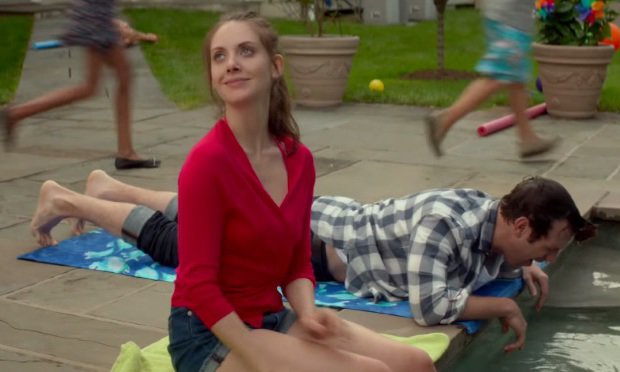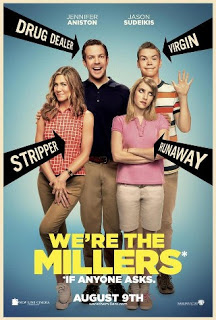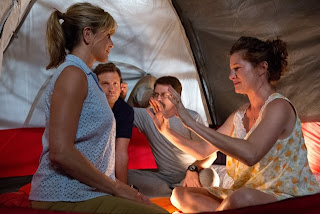Sleeping with Other People, the new film from writer-director Leslye Headland (Bachelorette) has elements that make me hate most other rom-coms. Though set in New York City, every character with more than a few lines is a white, straight person and the script had enough gender-stereotyping to make me want to bite someone. But near the start we see Jake (Jason Sudeikis), the lovable Lothario star of way too many other movies, try to explain away his latest infidelity to his girlfriend as they argue in the middle of a busy New York street. As he seems to bullshit his way back into her heart–and bed–she suddenly pushes him, hard, into the path of an oncoming cab. He escapes with only minor injuries, but he does get hit, and we in the audience feel the impact: this film is trying to be different from the rest.
The most interesting conceit of the film is that both main characters realize they’re too damaged to be together. Alison Brie as Lainey cannot stop hooking up with her gynecologist fuck-buddy (Adam Scott) who went to college with both Sudeikis’s and Brie’s characters (it’s supposed to be 13 years later and, uh, some of the actors seem a little mature to be in their early 30s) whether or not the two are in “monogamous” relationships with other people or not. After Jake and Lainey have dinner together and confess their failings, Lainey says, “We gotta just be friends.” and they discuss a “safe word” they can use to dispel sexual tension between them. They decide on “dick in a mousetrap” (“mousetrap” for short).
For the rest of the film, which covers a couple of years, we follow the relationship of these two characters who are “not a couple but…act like one.” They don’t kiss or have sex but don’t deny they want to either. When they’re in a store talking as they browse one of the clerks tells them what “cool” married people they are and Jake and Lainey play along. When, in a crisis, Lainey rushes to Jake’s place they lie in the same bed, fully clothed and she asks, “Are we in love?” He doesn’t say no.
Sudeikis’s character is one of those annoying guys in movies who doesn’t have to worry about money (he and his business partner have developed software together that is bought out by another company for millions). He brings a nice self-awareness (including a touch of self-loathing) as a man who compulsively picks up women and can never stay faithful to any of them (the concept of polyamory seems not to have occurred to anyone in the film).
Brie has the better written part in Lainey. Instead of, like Jake, having sex with strangers she takes some time off from dating, and in a great rarity for any onscreen character, especially a woman, begins a process of permanent change. She gets into medical school. She stops answering the gynecologist’s calls. When someone asks her why, she says, “Because I’m not an asshole,” leaving unsaid the words “any more.” When Jake asks her why she continued the relationship with the gynecologist for so long, she tells him, “I thought he’d choose me,” and the melancholy and weariness in her voice comes closer to real-life romantic disappointment than most rom-coms ever tread. Her last scenes with the gynecologist seem to imply he feels a sadness too, demonstrating what most adults learn: getting to choose what you want (or don’t) and not getting to can be equally dissatisfying.
Sudeikis and Brie have great chemistry together and the film is quite funny especially when Jake’s business partner (Jason Mantzoukas) and his wife (Andrea Savage) are in a scene. The wife, Naomi, tells Jake and Lainey, “Don’t have kids,” then says to the adorable preschool daughter she’s carrying on her hip, “No offense.” The other supporting roles (except for Natasha Lyonne’s throwaway appearance as Lainey’s queer friend) are also written and cast with exceptional care, especially Amanda Peet (who really shines here) as Jake’s knockout boss, whom he’s always asking out even after she tells him she doesn’t date her employees.
The film is not without parts I would complain about in a film by a man and am dumbfounded to see in one directed and written by a woman. Lainey spends time in lingerie for seemingly no good reason except to show off Brie’s lovely body (the film purports to be a sex comedy but never shows any real nudity). In another scene Jake uses an empty glass bottle to shows Lainey how to touch her own clit. For maximum offensiveness he imitates Public Enemy while he does so.
But even these scenes can’t ruin the emotional resonance of Jake and Lainey’s relationship which we see makes each a better, more whole person able to move on and have a romantic relationship with someone else. As a bonus we see the two characters attend a child’s birthday party high on ecstasy (molly) and the script has them act like real-life people who’ve taken the drug. When the entertainment for the party is a no-show, Lainey tells a worried parent, “Re-laaaaax,” and leads the kids in a dance to David Bowie’s “Modern Love.” Even if this method isn’t how adults usually get through these occasions, the film suggests maybe it should be.
[youtube_sc url=”https://www.youtube.com/watch?v=VYlEqlTsSJY” iv_load_policy=”3″]
___________________________________________________
Ren Jender is a queer writer-performer/producer putting a film together. Her writing. besides appearing every week on Bitch Flicks, has also been published in The Toast, RH Reality Check, xoJane and the Feminist Wire. You can follow her on Twitter @renjender








